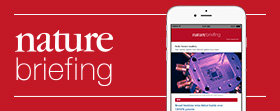So, it seems that neutrinos cannot travel faster than light. Since the OPERA collaboration reported six months ago that they could, some sizeable systematic errors have been uncovered, and the result might not stand up to further scrutiny.
The situation has prompted the fundamental-physics community to discuss the proper way to handle cases in which preliminary experimental results challenge 'established' laws. (In this case, one that many physicists hold dearer than most — Einstein's special theory of relativity.)
Some colleagues feel that such results should not be highly publicized, at least until the findings have been properly checked. In hindsight, the frantic attempts to analyse, understand and reproduce the OPERA result may seem unnecessary. But I believe that fundamental physics learned much in those months of madness, as scientists chased the dream of a fundamental revolution.
The unexpected result has inspired more than 200 studies since last September — a huge number, given the usual pace of publication in fundamental physics. In my field of quantum-gravity research — a pretty active field — a result would be considered to have taken the community by storm if it inspired this number of studies over four or five years.
Of course, not all the papers were impressive. But some research programmes produced valuable results in a very short time.
Thanks to Internet communication, the OPERA experiment was scrutinized remarkably quickly, in an unprecedented example of what the twenty-first-century scientific method may look like. Within 48 hours of the announcement, analyses showed that the recorded speed of the OPERA neutrinos was at odds not only with special relativity, but also with other neutrino speed measurements.
I cannot be the only theoretical physicist to be astonished at how the experimentalists were able to arrange within weeks a second run of the experiment, which used shorter neutrino pulses. The results were the same — showing that the statistical methods developed by OPERA to handle the original results were reliable, which could prove valuable for future experiments.
“We will surely benefit from the shared expertise produced by studies of the opera anomaly.”
Some of the results on the theory side are relevant to my own research, on the interplay between quantum mechanics and relativity at particle energies much higher than the ones we can probe with accelerators — in particular, at the 'Planckian' energies of the Big Bang. In this ethereal research area, one live debate concerns whether the theories proposed to replace special relativity should preserve the relativistic description of different observers. Remarkably, the same issue turned out to be important in the investigations of the OPERA result: the implications of superluminal neutrinos for the properties of other particles depend on whether or not a relativistic description of observers is preserved.
As we return to our Planckian ivory towers, we theorists now know that the topics we discuss could one day actually matter. And we get something in return, because some of the results for revising relativity at energies already achieved in accelerators will contribute to our study of the fate of relativity at Planckian energies.
Perhaps most importantly, the OPERA affair pushed researchers from different research areas, some of whom never talk to each other, to share their expertise. For example, very few particle physicists have the chance to appreciate the subtleties of the description of time measurements in quantum mechanics. Yet here, some particle physicists were talking to experts on the conceptual foundations of quantum mechanics, who are in a better position to assess the nature of the neutrino travel time determined by OPERA. As we get better at determining the travel times of particles in accelerators — and OPERA is a good example of this trend — we will one day need to deal with the slippery aspects of the description of time in quantum mechanics. When we do, we will surely benefit from the shared expertise produced by studies of the OPERA anomaly.
But there is a possible negative outcome, and one that we must prevent.
As in most modern particle-physics experiments, the analyses were 'blinded' — the criteria used, including the estimates of systematic errors, were fine-tuned before the data were looked at. Once the data were analysed, the results were announced without much delay and with no further tweaks. If the preliminary OPERA result is indeed not confirmed, some are bound to propose that we soften the blind-analysis standards, to guard against the perceived wastefulness of questioning a sound law. Experimentalists who find that their results contrast with 'known' physics might be encouraged to postpone announcement of the results, and first look determinedly, in a non-blinded way, for systematic errors that might make the contrast go away. This would introduce a potentially disastrous bias against important discoveries. Questioning our laws, even on the basis of preliminary experiments, is a healthy exercise. We must assume that the next fundamental physics revolution is just beyond our nose, safely outside the reach of our brains, but within the grasp of the next truly innovative experiment.
- Journal name:
- Nature
- Volume:
- 483,
- Pages:
- 125
- Date published:
- ()
- DOI:
- doi:10.1038/483125a



Comments for this thread are now closed.